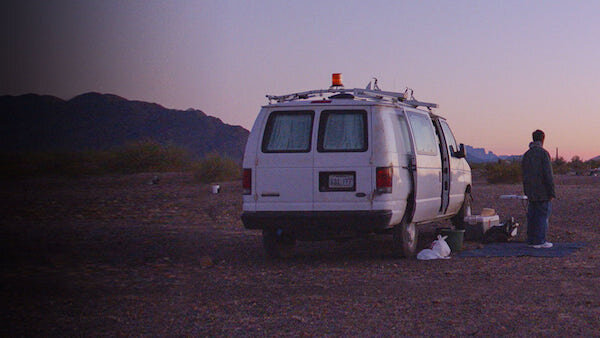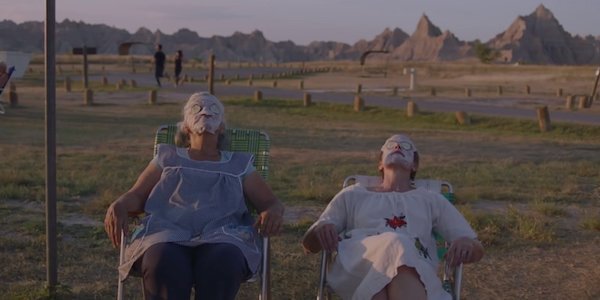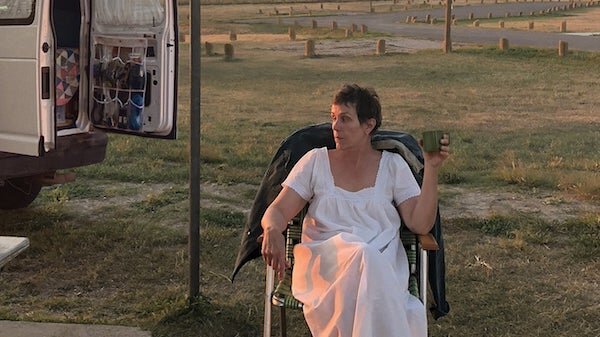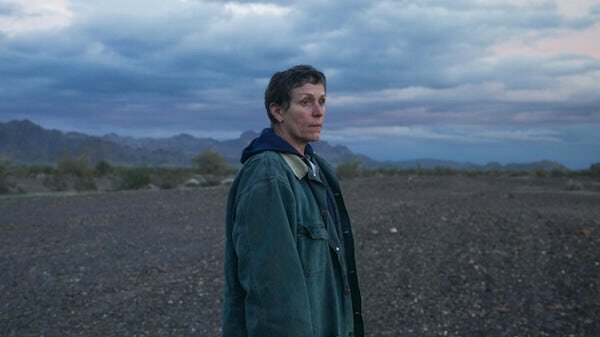A story about choice, freedom, loss and peace, Nomadland has been celebrated for its poetry, but there’s also room for questioning its political positioning – or lack thereof. Brianna Zigler looks into the murky ethics of this year’s Best Picture winner.
On a trip to Badlands National Park in South Dakota, Fern strays from her tour group. While the other visitors and Fern’s friend, Linda May, dutifully listen to guide and fellow nomad Dave, as he explains how rubbing stones from the surrounding area together makes it easy for palaeontologists to find fossils there, Fern makes her great escape. She disappears within the vastness of the ancient rock formations, until it seems like she’s far enough from the others that she may never be found again. She leaps, bounds, and bounces from one point to another, like a carefree child in her terrain-inappropriate skirt, looking only to get lost. Until she actually does, and a moment of panic whirls her around to the assuring voice of Dave. Among the towering mesas, she climbs up to his height and looks out at the expanse before her. She smiles, and she leaves to get lost again.
Chloé Zhao’s Nomadland is, in part, a film about choice. Loosely based on Jessica Bruder’s 2017 nonfiction book Nomadland: Surviving America in the Twenty-First Century, the story centers on Fern (played warmly by Frances McDormand) – a fictional former resident of the real town Empire, Nevada, where a reduced demand for sheetrock and the fallout from the economic collapse of 2008 coalesced into the dissolution of the entire town. In a title card at the beginning of the film, Zhao explains that the zip code for Empire was discontinued in July 2011. In the wake of losing her job at the U.S. Gypsum plant there and the recent death of her husband, Fern hit the road of the American West, living out of a painstakingly modified white van lovingly named “Vanguard,” forging connections with other modern-day nomads and learning how to live sustainably on very little.
The lyrical film is a tender portrait of the intimacy forged from distance, of community versus individualism, and of the way capitalist society has pushed Western civilization to neglect its connection to our planet – having taught us to favor exploitation of land in pursuit of immediate gratification, over preservation in favor of long-term prosperity. Nomadland is a patchwork quilt, stitched lovingly together with close-ups of its scruffy, rugged real-life nomads and juxtaposed sweeping landscape shots, where the human subjects within them appear on the verge of being engulfed by the scenery. It’s a concurrent reminder of the earth’s ability to take us out as easily as it embraces us, and that our capability of living in harmony with the natural world teeters precariously on our contemporary presence within it.
After watching Nomadland for the first time, I was left bleary-eyed and in awe; it made me feel hopeful for the future of the planet amidst an endless stream of bleak and even bleaker news developments released at a seemingly breakneck speed. Human beings are destroying the Earth, but we are also the only ones with the power to save it. As long as we are here, trying to make a difference, trying to live more ethically, there’s still hope. On a second watch, however, I began to question Nomadland’s hesitance to provide clarity on its paradoxical political ideologies – my idealistic feelings had shifted further towards cynicism, and I took a closer look at the images which proliferated the film that I had once more easily glossed over. Corporations, IP, and gas-guzzling vehicles loom large and overwhelmingly unchecked against this inherently environmentalist message about the inseparability of humankind and mother nature, and of the pitfalls of modern individualism. And though realistic in terms of the way even the most environmentalist lifestyles must be dictated, it creates a blank space left entirely for us to fill in, as if the film is not necessarily bold enough to answer its own questions.
Nomadland is a film about choice, but Fern is not necessarily a nomad because she has to be, and neither are all the nomads she meets on her travels. Some have taken on the nomadic lifestyle because of a desire to leave the trappings of our capitalistic world and grow closer to the earth, while others weather fresh wounds from lost loved ones or traumas that they ache to move on from. And while not to negate these experiences, far less spoken for are the people for whom the nomadic lifestyle fell upon because they were truly left with no other option – Fern, as we learn, is not exactly such a person. She has family who are quite well off, and whom she distanced herself from long before her economic hardship. Similarly, Dave is an absent father whose son and daughter-in-law are parents-to-be and live happily elsewhere, desiring more of a connection with him – although it does feel like neither party is quite ready to fully pursue the complexities of their relationship. Fern had already wished to detach herself from her family, and her economic hardships gave her this final excuse to let go for good. For Fern, the dissolution of Empire now seems like more of an opportunity than anything. The nomadic lifestyle, similarly, offered Dave an opportunity to continue eluding his parental responsibilities.
Nomadland is a film about choice – and yet, the film itself makes the choice to opt out of politicizing its highly political iconography. It presents loaded images with what feels like a reluctance to offer any position on their meaning or cultural consequences, beyond their immediate relationship to the film and its characters. This is what has irked me, since the film’s debut at the virtual New York Film Festival in 2020 and discussion has boiled over in the weeks after the film released wide in the US in 2021. Offered sans what is being viewed as tangible subtext is a schism between this modern nomadic lifestyle and American capitalism and colonization, in a film where the majority of people depicted looking to live off the land and reconnect with the planet are white, and often not necessarily impoverished. Still, it is intriguing to consider whether there needs to be a palpable position offered by the filmmaking separate from what we can draw out as the audience. We are aware of the contradictions of Fern’s life in contrast to her chosen lifestyle, and it adds a texture in this dichotomy between the ethical and the unethical in regards to living sustainably in America.
On one lonely night during her travels across the Midwest, Fern saunters up to a movie theater with a marquee presenting the Marvel Cinematic Universe’s first Avengers movie. A period marker to signify the year as being 2012, the eerie visual – in which the framing of the theater and its massive neon lights against the backdrop of an otherwise pitch black night threaten to consume Fern, a vulnerable insect in comparison – acts as a foreboding harbinger of the growing monopolistic forces that threaten not just the media landscape, but the physical landscape as well. As Zhao is intended to helm an upcoming Marvel film, Eternals, it’s another visual with somewhat ominous connotations to the viewer. Zhao both helps to sponsor the Marvel machine that she is now a part of (it is worth noting that Zhao approached Marvel to make a movie with them) and also establishes the threads which set up Marvel’s impending cultural domination on the film and pop culture industries. Ironically, Zhao’s fellow Oscar-nominated director Emerald Fennell – the two women now history-making winners after taking home Best Director and Best Original Screenplay respectively – recently became tasked with writing a new film for the DCEU.
The film’s questionable depiction of brands then leads to Fern’s ability to live off the land, which was bolstered by her brief stint working at an Amazon warehouse. It’s a form of employment with well-documented abysmal and exploitative working conditions and yet, in this context, it is a positive force for good. But the film skirts around more than just the darker reality of Amazon employment. One night, one of Fern’s fellow nomads enlightens an eager crowd on how humans and the stars in the sky share an inextricable genetic connection, in the same film where Fern and her nomad friends are enthralled by behemoth RVs that they could never afford; something presented as both awe-inspiring and unrealistically aspirational. At one point, a nomad articulates her desires to build a house that is entirely self-sustaining, one that will live on after she has passed away – a noble and environmentally conscious choice, if not one that requires someone to have the necessary finances to make it happen.
Nomadland ultimately hinges on a series of conflicting ideologies that are never properly interrogated. But I don’t believe this is necessarily a negative thing. They produce a film which is entirely American – or, I should say, American as it is known today. As that theater marquee and its Avengers title looms large over Fern, it creates a shot which manifests as the anchor of the entire narrative: our choices to be ethical are dictated entirely by the unethical. Watching the film, it was unclear to me, and many others, exactly where Zhao landed on her inherently contradictory themes, and thus became frustrating. This lack of interrogation not only in regards to these images that go against what the film purports to stand for, but the lifestyle choices of Fern and many of these other nomads opposing those for whom such a lifestyle is not a choice. The voices of these people are far less heard, their decision to live sustainably not a question of ethics, but of survival. But that’s what makes Nomadland American: within our suffocatingly capitalist society, some people have the choice to adopt this lifestyle, and some don’t. What should be universal is select, and even then, it is not an entirely unblemished ethos.
When Fern finally visits her estranged sister Dolly and her husband George at their comfortable home, Dolly remarks her pride in Fern (no matter how forced it may be) for taking on the nomadic lifestyle – proffering to a circle of other well-off, white friends the idea that nomads are comparable to the pioneers. On one hand, the remark could be viewed as only symptomatic of Dolly’s ignorance to Fern’s lifestyle choice, but it also carries a lack of subtlety that leads straight to Nomadland’s conflicted heart, and provides an inkling of cognizance that the film is, perhaps, more self-aware than has been given credit for. The pioneers had their hand in the wiping of Native Americans from North America, so that their kind could prosper instead. Now, white people are choosing to co-opt this spirituality they once decimated. The choice to prosper allowed those with better means to take control. And so it feels like less of an indictment against Fern and her kind than an acknowledgment of one of the many ironies inherent in a country that purports anyone can pull up their bootstraps and attain happiness.
And this is not to say that economically-stricken white people in particular are in a position to be scorned for their choice to take on this lifestyle, especially when it’s less of a choice than a necessity — nor that the choice to live sustainably is not a noble one, especially now. In the final moments of the film, Fern returns to her beloved, abandoned Empire. She ambles through her former home, now vacated of the warmth and character once granted to it by people who loved it living within. The expansive backyard she had previously described to a fellow nomad now lays before her, brimming with promise, and Fern once more makes the choice to get lost precisely because she can make it. The film cuts to the camera trailing behind Vanguard as she winds her way through the roads of the American west, Fern assumedly at wheel, charting its course to an inevitable nowhere and everywhere.
Upon a second viewing, the beauty inherent in Fern’s concluding journey is now laden with a twinge of irony. Fern can go wherever she wants, whenever she wants, because she has a safety net. The road is hers because it can be – just as our world can be co-opted by brands and franchises. Perhaps an unkind or contrived comparison, it is nevertheless the connecting thread which unites Nomadland’s string of seemingly at-odds ideas. It’s the thread that harkens back to the very pioneers with whom Fern shares the same DNA as the stars; who founded this country on blood and broken promises, to offer opportunity to those with the means to flourish. Towards the beginning of Fern’s journey, a coworker at the Amazon warehouse shows off a tattoo on their arm of a song lyric: “Home: is it just a word? Or is it something you carry within you?” The song from which the lyric derives was released in 2017, five years after this film takes place. Nomadland is as fittingly dissonant as its promised land.
Brianna Zigler (@briannazigs) is a freelance film writer based in the Philadelphia suburbs. She loves movies about sad boys and has words in Film School Rejects, Screen Queens, Vague Visages, Much Ado About Cinema, and more.





